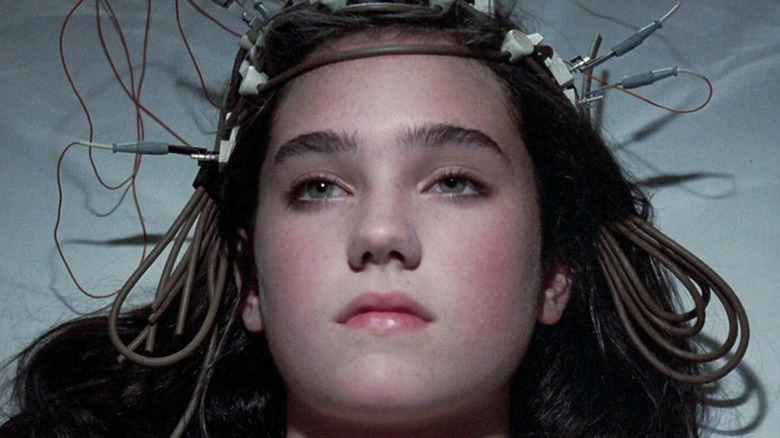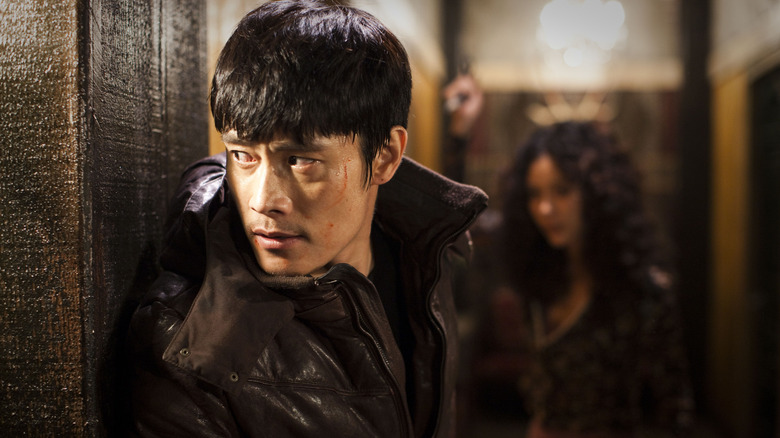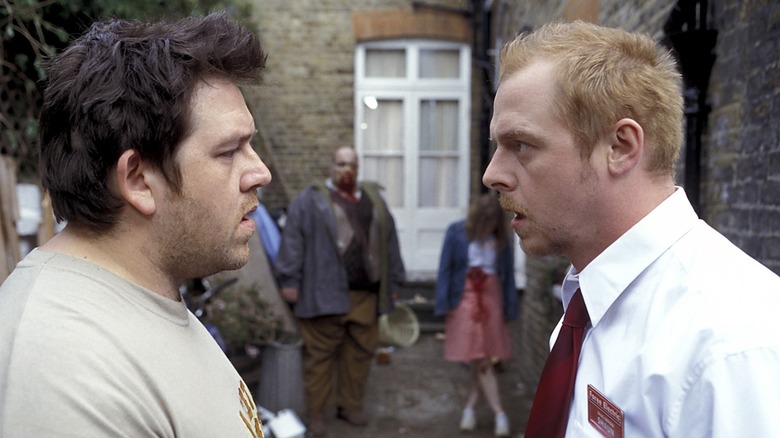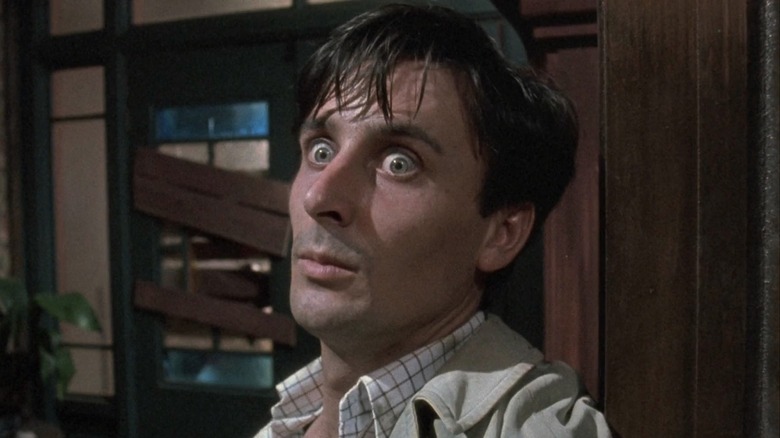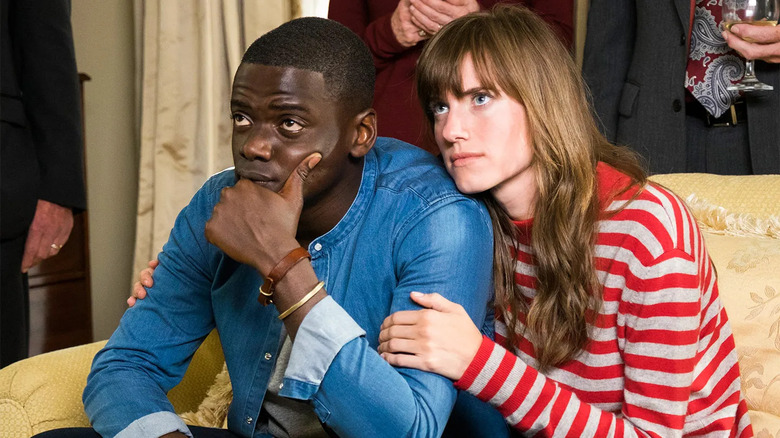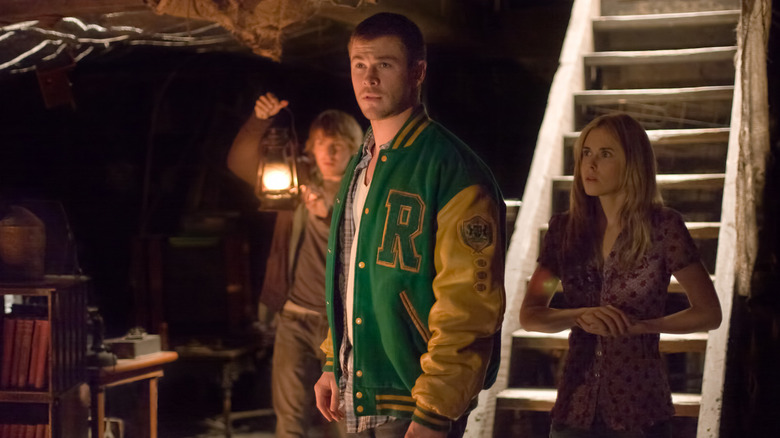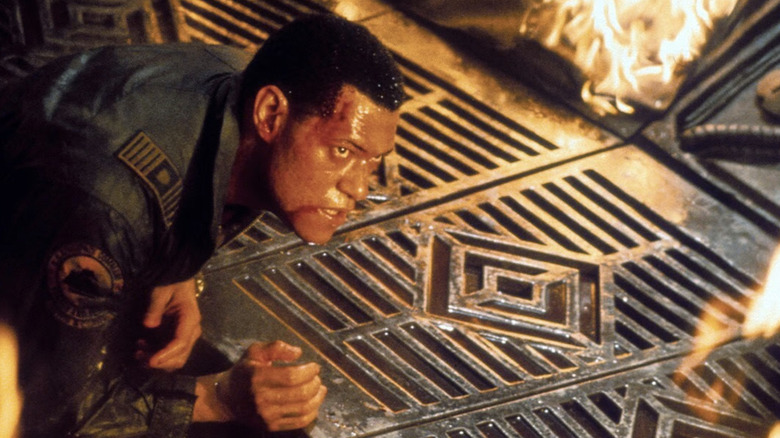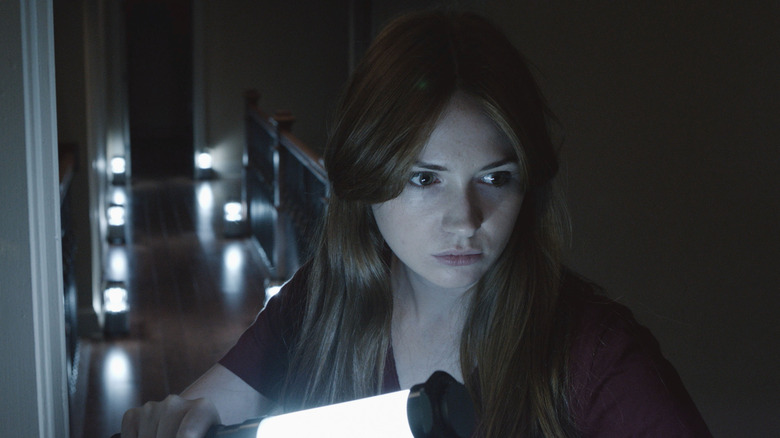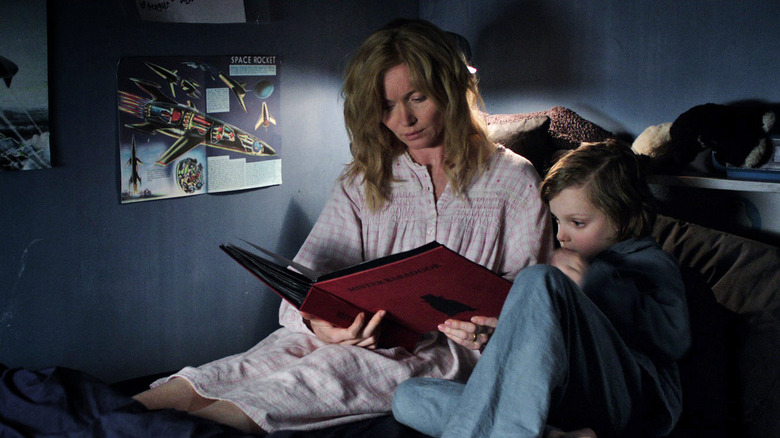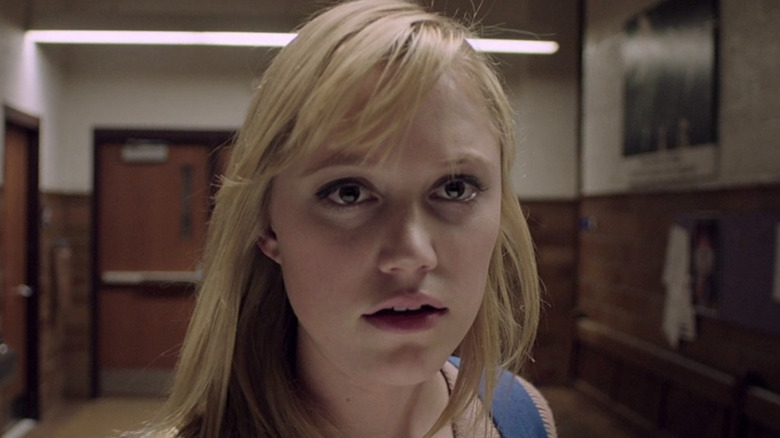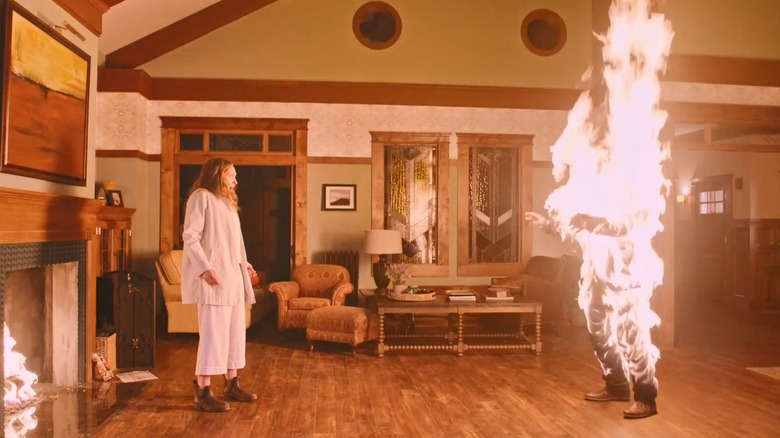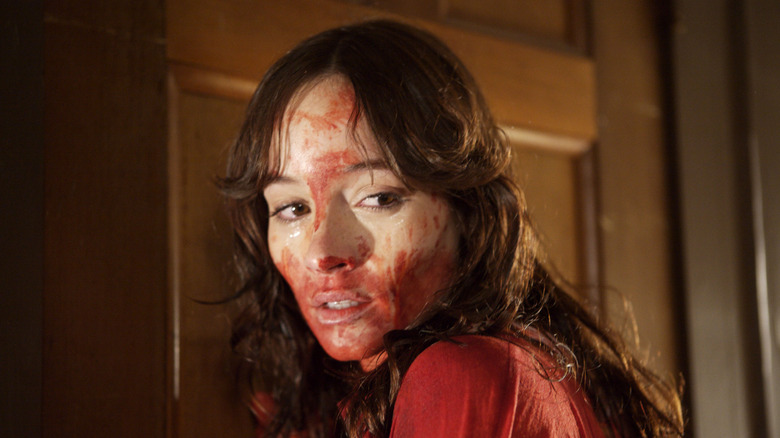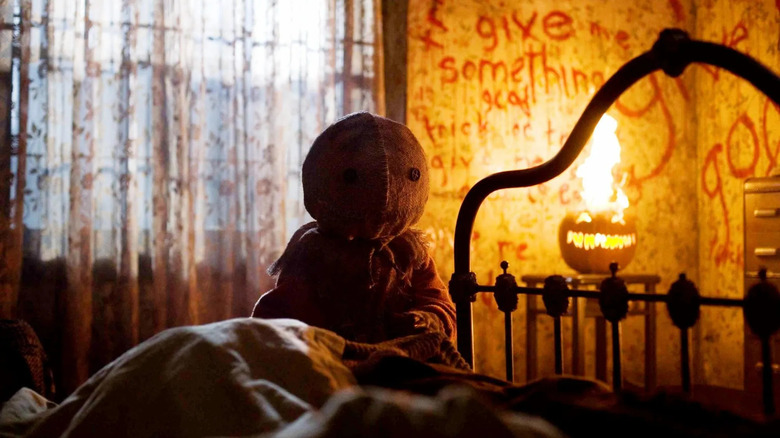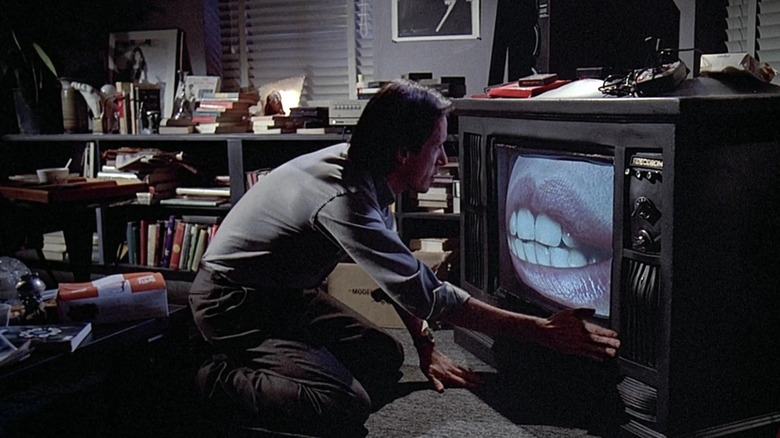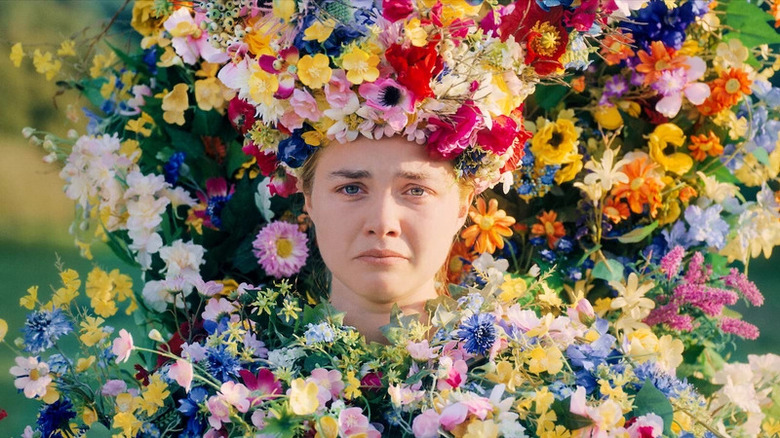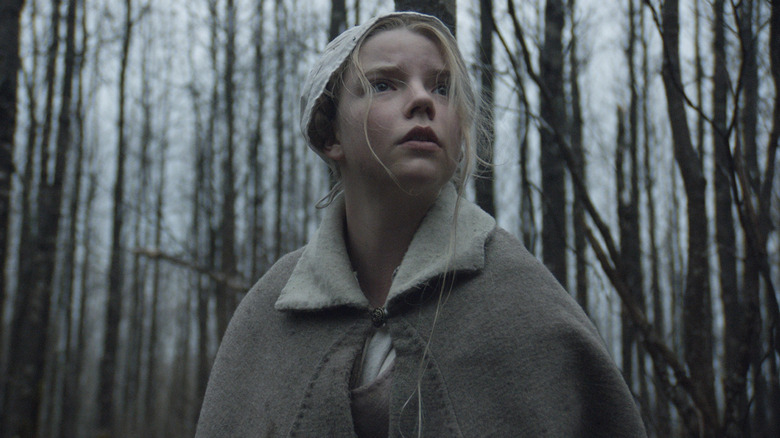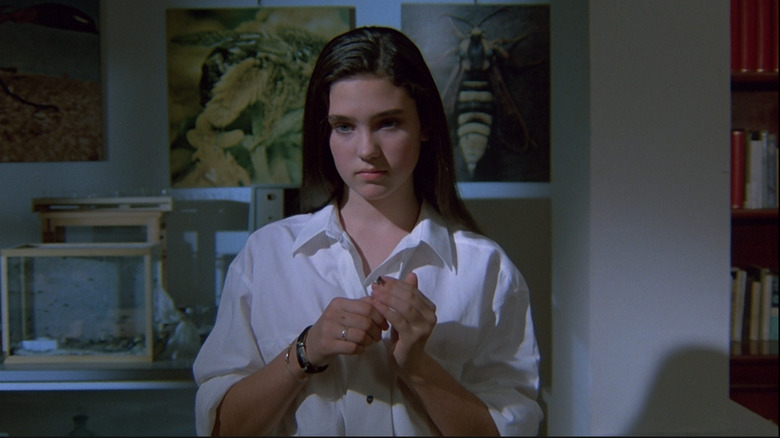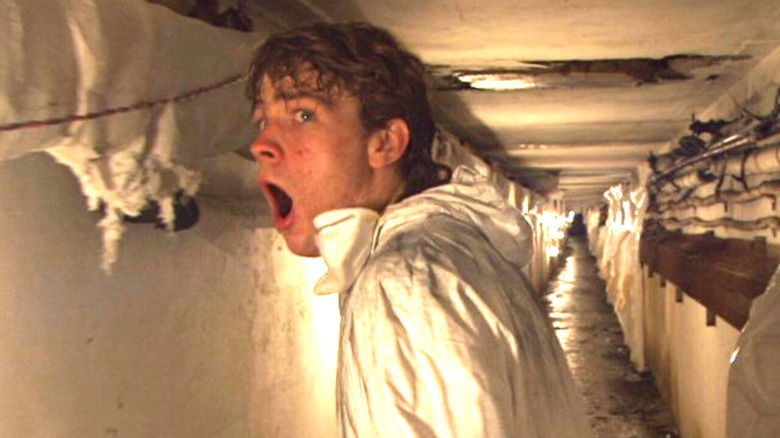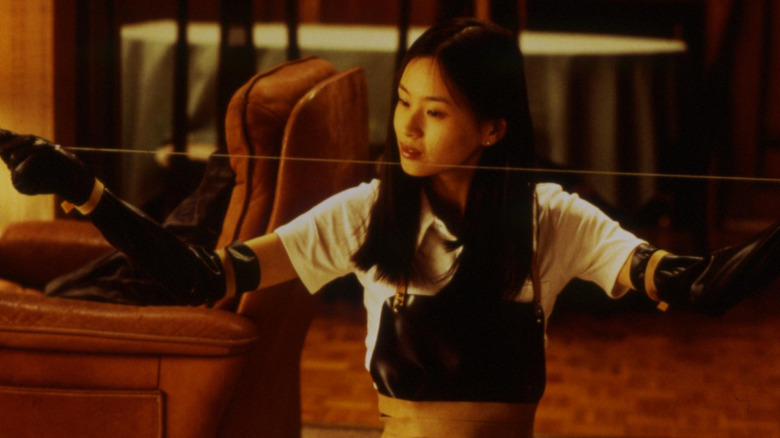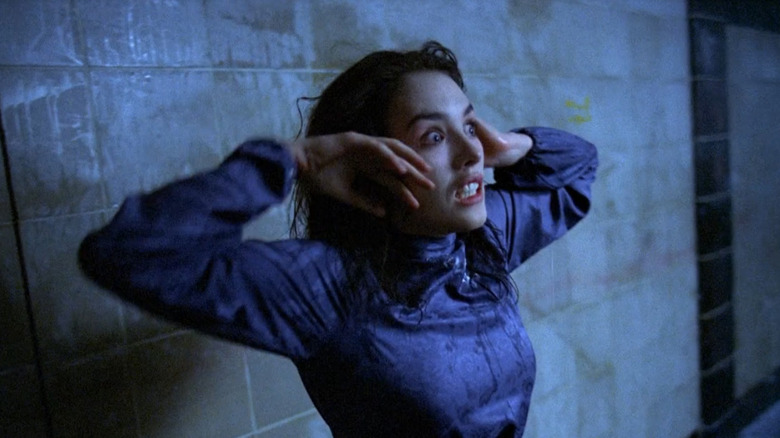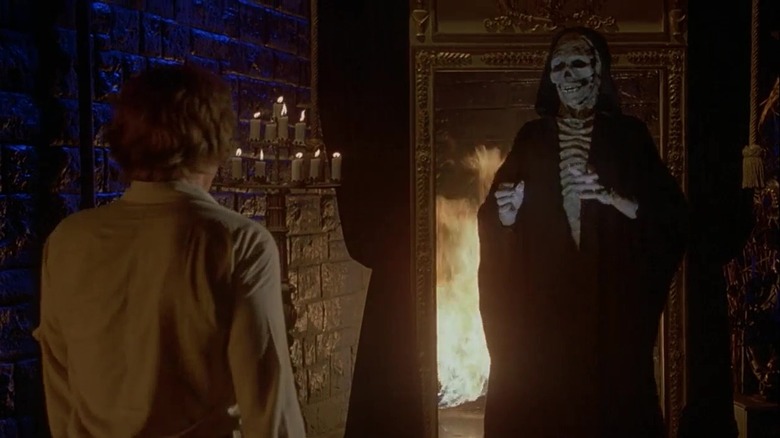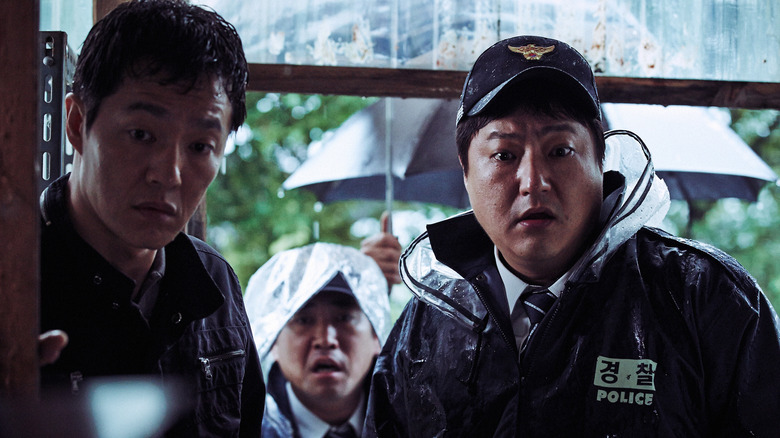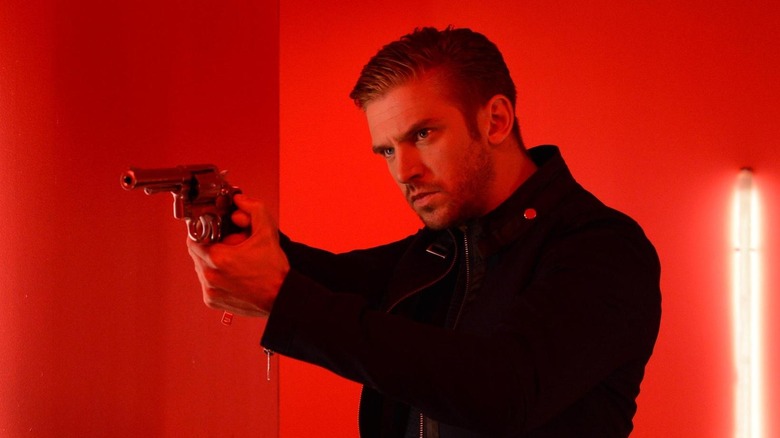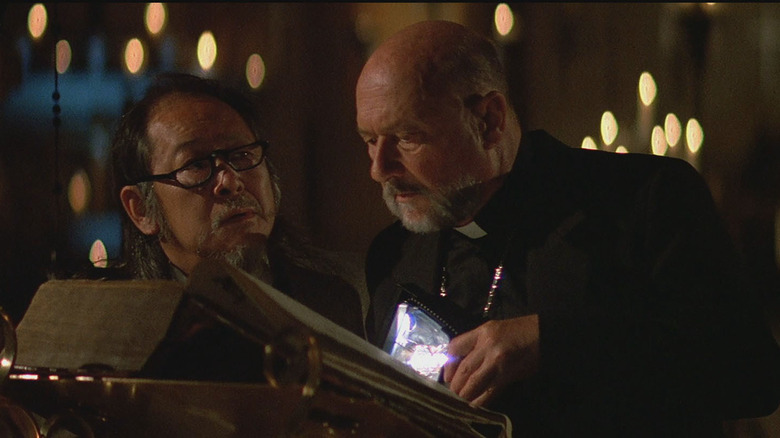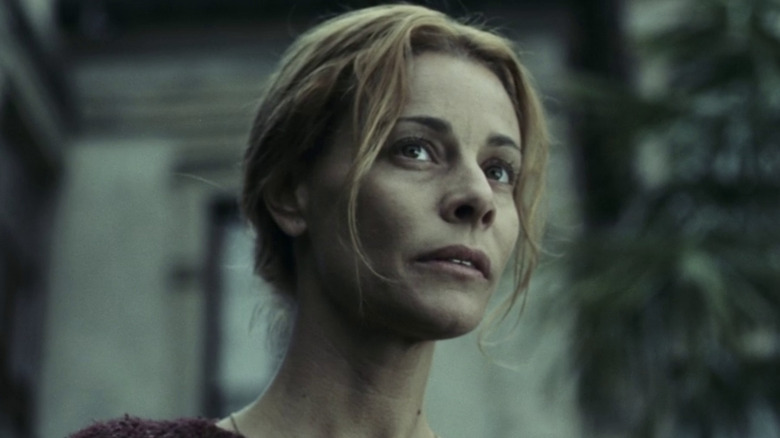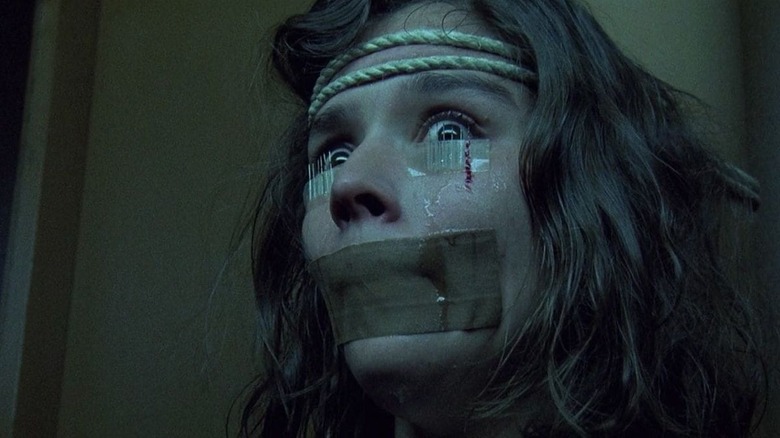The Best Horror Movies That Never Got A Prequel, Sequel, Remake Or Reboot
If there's ever a movie genre that comes with an expectation for sequels, prequels, reboots, or follow-ups, it's horror. From the countless sequels to "Friday the 13th" or the endless number of reboots and remakes of "Halloween," the genre is notorious for resurrecting cinematic properties from the grave, no matter how definitive their endings may appear. However, there are several fan-favorite horror movies — including some helmed by celebrated horror filmmakers — that have yet to get the remake or sequel treatment, which has left the legacy of that original story intact and untarnished.
From the unrelentingly grim horror movies of East Asia to classic giallo cinema from Italy and overlooked indie darlings in America, many beloved horror movies remain untouched by follow-ups or reinterpretations. Here are the best in the delightfully macabre genre that remain without a sequel, remake, prequel, or reboot to continue or reimagine the original film's story — at least for now.
I Saw the Devil
The price of obsessive revenge serves as the thematic centerpiece of the 2010 South Korean horror movie "I Saw the Devil," which plays out in a deadly cat-and-mouse game between a government operative and serial killer. After National Intelligence Service officer Kim Soo-hyun (Lee Byung-hun) loses his pregnant fiancée to mass murderer Jang Kyung-chul (Choi Min-sik), he swears vengeance and vows to pick apart Jang's entire life. To prolong this vendetta, Kim deliberately lets Jang free to continue to stalk and torment him, even as Jang adds more victims to his grisly body count.
The Los Angeles Times praised "I Saw the Devil" for balancing its bloody mayhem with "its undercurrent of real emotion," and it's this sad and tragic aspect that sets it apart from typical horror films. In a retrospective review, Paste regarded "I Saw the Devil" as the best horror movie from 2010, feeling that this deliriously violent meditation on the hollow victory in revenge was criminally overlooked during its initial release.
It was announced in 2013 that the English-language remake rights to "I Saw the Devil" had been optioned and "The Guest" writers Simon Barrett and Adam Wingard would tackle the adaptation (per The Wrap).
However, nothing has come of the project yet, and in 2021, Barrett told iHorror.com that it's probably for the best because "even though it would have been much different than the original, it would have just probably annoyed some people" and ultimately, the fact that a movie hasn't been made in your language isn't reason enough to remake it.
Shaun of the Dead
After working together on the British comedy series "Spaced," filmmaker Edgar Wright and star and co-writer Simon Pegg teamed up for the 2004 horror comedy movie "Shaun of the Dead." Inspired by their love of George A. Romero zombie movies and the "Resident Evil" video game series, the film features a zombie invasion of the United Kingdom (per The Guardian). Perpetual slacker Shaun (Pegg) leads his best friend Ed (Nick Frost) and ex-girlfriend Liz (Kate Ashfield) to seek refuge from the undead at their local pub with their friends.
With Wright's signature knack for kinetic staging and editing, along with plenty of references to classic horror movies, "Shaun of the Dead" delivers solid laughs punctuated by gory zombie action, which has made it a hit with critics and audiences alike.
Wright re-teamed with Pegg and Frost for two standalone follow-up films — "Hot Fuzz" and "The World's End" — and all three make up the "Cornetto trilogy" since they feature different flavors of Cornetto ice cream. The three films may be part of the same trilogy, but each one focuses on different characters and delves into its own genre, so neither "Hot Fuzz" nor "The World's End" is really a sequel to "Shaun of the Dead."
Apart from Pegg and Frost cheekily reprising their "Shaun of the Dead" roles for a British public service announcement encouraging people to stay at home to prevent the spread of COVID-19, there has been no sequel.
Braindead
Long before he helmed major Hollywood motion pictures like "The Lord of the Rings" or "King Kong," filmmaker Peter Jackson crafted low-budget horror comedies in his native New Zealand. Among the most notorious and effective of Jackson's early work is the 1992 zombie movie "Braindead," which was originally released in North America under the title "Dead Alive." A solid cult classic, "Braindead" is regarded as one of the goriest films ever made and a highlight among Jackson's horror work (per Dark Universe).
A plague-ridden rat-monkey from Skull Island is captured and transported to the Wellington Zoo. Those bitten by it become feral, eventually rising as ravenous zombies. Young man Lionel Cosgrove's (Timothy Balme) mother Vera (Elizabeth Moody) is the first to become infected, and he tries to keep the undead outbreak a secret — even as the number of zombies steadily grows. With nearly 80 gallons of fake blood reportedly used for the climactic sequence (per RogerEbert.com), "Braindead" is Jackson at his most gruesomely unleashed.
While Jackson told Uproxx that he's working on a 4K re-mastering of "Braindead," that's the current extent of revisiting this title and we look forward to seeing the film's gore in its most gruesome detail.
Get Out
Following an acclaimed career in comedy as the co-creator and co-star of the sketch comedy series "Key & Peele," filmmaker Jordan Peele turned his attention to horror. Peele made his feature directorial debut with 2017's "Get Out," which he also wrote and produced.
Chris Washington (Daniel Kaluuya) travels with his white girlfriend Rose (Allison Williams) to meet her family in her hometown in upstate New York. Shortly after arriving, however, Chris discovers that the people of this sleepy community harbor a dark secret and that he's the next target for their insidious goals.
"Get Out" brought something fresh to the genre in a way that makes it appeal even to those who don't typically watch horror, thanks to the way that Peele imbues his story with biting social commentary about being Black in the United States along with sharp satire about the American experience.
It was a major critical and audience hit and Rotten Tomatoes named it one of the best horror films of all time. It's one of the few genre movies to be nominated for Academy Awards like best picture and best director and Peele won the Oscar for best original screenplay (per Oscars.org).
Peele told Business Insider that "Get Out" was the first of five horror movies about different "social demons" that he planned to make, all of which would explore "these innately human monsters that are woven into the fabric of how we think and how we interact."
2019's "Us" was the second of these titles and 2022 saw the release of "Nope." While these movies have this common thread of social commentary, they're each stand alone and to date, there's been no attempt to revisit "Get Out."
The Cabin in the Woods
"Buffy the Vampire Slayer" and "Angel" collaborators Drew Goddard and Joss Whedon reunited for the 2011 critically acclaimed feature film "The Cabin in the Woods." Goddard directed and Whedon produced a screenplay that they wrote together.
With its intentionally well-worn horror movie premise, "The Cabin in the Woods" sees a group of college students vacationing at a remote cabin, only to be unwittingly targeted by a cabal of scientists. The scientists must complete a supernatural ritual to stop the apocalypse, so they unleash a number of common horror movie monsters to prey upon the students and get the sacrifice that they need to save the world.
"The Cabin in the Woods" leans into the creative team's penchant for self-aware storytelling, poking fun about established tropes within the genre while subverting audience expectations at the same time. In an interview with Total Film, Whedon referred to the movie as "a very loving hate letter" to the horror genre, which critiques all the perceived shortcomings of horror storytelling in a fresh way.
Playing on the familiar hallmarks of the genre while crafting its own fright-filled commentary, "The Cabin in the Woods" offers a fresh horror twist that has yet to be revisited. Although the ending doesn't leave much to follow up with for a sequel, that's never stopped a horror franchise before.
However, Goddard told Fandango, "I just feel like that continues to be the perfect ending for that movie and I never want to undercut it" by doing a sequel, although he hasn't ruled out the possibility of coming upon an idea that "does the first one justice."
Event Horizon
Though filmmaker Paul W.S. Anderson may be known for helming an exhaustive number of "Resident Evil" movies, his finest work in the horror genre is the standalone film "Event Horizon." Combining hard science fiction with unabashedly supernatural horror, "Event Horizon" sees a group of astronauts discover a missing spaceship, only to learn demonic forces have possessed the vessel and have targeted them as its next victims.
In a making of "Event Horizon" DVD feature, producer Jeremy Bolt describes the film as "a ghost story in space" and clearly, Anderson was keen to heighten the premise's paranormal potential.
Though not initially successful upon its theatrical release, "Event Horizon" found greater success on home video and has become a bonafide cult classic. In an oral history about the movie for Inverse, Anderson remembered Kurt Russell telling him that despite the movie's initial disappointing run, "in 20 years, that's going to be the movie you're really glad you made," which is exactly what happened.
In an interview with The San Diego Reader, Anderson said that a director's cut won't be possible since the studio didn't hold onto extended footage. Although in 2019, Variety announced that a television series adaptation was in the works, there hasn't been more word on its development since then.
Oculus
From "Doctor Sleep" to "Midnight Mass," Mike Flanagan has become one of the most celebrated filmmakers in the horror genre to emerge in recent years. One of Flanagan's earliest feature directorial efforts is the 2013 supernatural horror movie "Oculus," which Flanagan also edited and co-wrote.
Siblings Kaylie (Karen Gillan) and Tim (Brenton Thwaites) investigate the cursed legacy of a haunted mirror that destroyed their family when they were children. The story unfolds across two time periods, moving between Kaylie and Tim's childhood experiences to their present-day investigation quickly going awry.
Many of Flanagan's common narrative themes that are present in his later work are prominently on display in "Oculus," including the childhood end of innocence, paranormal menace, and a physical point that's haunted. The dual narrative underscores much of the tragedy, with Flanagan later reusing the storytelling device for his acclaimed Netflix original series "The Haunting of Hill House."
In 2014, Flanagan talked to JoBlo about the possibility of a sequel, noting that he'd be interested in it if he "found a story that's as exciting" as the original because otherwise, he has no interest in getting "in the business of franchising the movie and crank[ing] out sequels to an idea even if it's worn out."
The Babadook
The narrative themes of grief and familial loss run heavy in the Australian horror movie "The Babadook," written and directed by Jennifer Kent in her feature directorial debut.
In the wake of losing her husband, widow Amelia Vanek (Essie Davis) struggles to raise her young son Samuel (Noah Wiseman) as a single mother. This is complicated further when the two are menaced by a supernatural creature known as the Babadook, which dangerously affects their behavior, as it prepares to strike.
Influenced by classic monster movies like the 1927 silent film "London After Midnight," which inspired the Bababook creature's design, Kent strove to utilize practical effects throughout the entire production (per Mountain Xpress). This underscored the movie's underlying theme of people making monsters borne from their own personal darkness, as Amelia and Samuel are both poisoned by their grief (per NPR).
"The Bababook" became the most critically acclaimed 2014 horror movie on Rotten Tomatoes and the fifth highest-rated limited release of the year on the site.
It's truly one of a kind, which Kent knows better than anyone, telling IGN that she owns the rights to any sequels to ensure that one will never be made because "it's not that kind of film" and a sequel "would destroy the integrity of everything we worked so hard to protect."
It Follows
Sex and death walk hand-in-hand in the 2014 indie horror flick "It Follows," written and directed by David Robert Mitchell. The movie involves a sexually transmitted condition, with recipients pursued relentlessly by a supernatural entity taking on a variety of forms, as it closes in on its prey. A young woman named Jay Height (Maika Monroe) is the latest person to receive the curse and searches for a way to escape her grim fate.
"It Follows" received near-universal critical acclaim upon its wide theatrical release in 2015, with the Rotten Tomatoes critical consensus declaring, "Smart, original, and above all terrifying, 'It Follows' is the rare modern horror film that works on multiple levels — and leaves a lingering sting."
With its steady escalation of suspense and effective narrative themes, this refreshing and stylized movie became a solid success, with Monroe lauded for her visceral performance. Though there was some talk of a sequel or follow-up to "It Follows" in 2015, there has been little word regarding the potential project's development since then (per Entertainment Weekly).
As Mitchell told Digital Spy, while he does have some ideas of where the story could go or how things could develop in the world of "It Follows," currently, he "like[s] the film as it is on its own."
Hereditary
Independent entertainment company A24 has become an acclaimed horror movie studio since its launch in 2012, as it has released modern favorites like "Under the Skin," "The Witch," and 2018's "Hereditary."
The movie marked the feature directorial debut of Ari Aster, who also wrote the screenplay, and was the catalyst for Aster becoming a major horror filmmaker in his own right. Exploring the dissolution of a family in the face of immense grief, "Hereditary" begins with grounded tragedy before steadily progressing into outright supernatural terror.
After the Graham family loses their young daughter in a horrific accident, they discover that they are being targeted by a sinister group for a dastardly purpose involving demons and malevolent spirits.
In an interview with NPR, Aster recalled pitching "Hereditary" as "a family tragedy that curdles into a nightmare," with this sensibility serving as the movie's emotional core. Bleakly terrifying, "Hereditary" is a searing look at a family divided before being manipulated by forces beyond their comprehension and it's hard to imagine a sequel or follow-up to the movie's ending that left audiences stunned.
The House of the Devil (2009)
One of acclaimed horror filmmaker Ti West's earliest feature films projects is "The House of the Devil," which is completely unrelated to the 1896 French silent movie of the same name. Written and directed by West, the film channels the aesthetics and styles of 1980s horror movies, right down to West shooting the movie on 16mm film and even releasing promotional copies on VHS (per The Independent).
College student Samantha Hughes (Jocelin Donahue) answers a call for a babysitting gig at a remote mansion, only to learn that the job is not exactlywhat was advertised. After learning the true occupants of the house were gruesomely murdered by her employers, Samantha finds herself in the middle of an occult ritual.
More than just wearing his influences on his sleeve, West subverts expectations about the genre to keep the audience on its toes while building the tension and violence in equal measure. A love letter to '80s horror, right down to its commentary on the satanic panic, "The House of the Devil" features West's filmmaking strengths on full display.
As Manohla Dargis wrote for The New York Times, West has "a real gift for the genre" and creates an atmosphere of dread that "even veterans twice his age have difficulty achieving." While West has become more widely known for his 2022 trilogy of "X," its prequel "Pearl," and the upcoming "MaXXXine," he's left "The House of the Devil" alone.
Trick 'r' Treat
The horror anthology "Trick 'r' Treat," written and directed by Michael Dougherty, saw its release relegated to a handful of film festivals after its premiere in 2007 but it has since grown to become a true cult classic (per Wired). With an all-star cast that includes Anna Paquin and Brian Cox, the movie subsequently found its audience on home video and has grown to become a Halloween favorite (per IGN).
It's Halloween night in the sleepy town of Warren Valley, Ohio and many of the residents have their own dark and bloody ways to celebrate the holiday. Framing the story is the diminutive burlap sack-wearing figure Sam, who enforces the unwritten rules of Halloween with lethal glee amidst the murder and mayhem. With everything from werewolves to zombies, "Trick 'r' Treat" is a full-on seasonal celebration of the macabre holiday with plenty of dark humor and gory carnage to go around.
Dougherty confirmed that the sequel is in active development during an October 2022 Beyond Fest screening of the movie (per Bloody Disgusting), but the follow-up has yet to be officially green-lit, so we'll just have to wait and see if Sam and others return to the big screen in a sequel that's as good as the original.
Videodrome
Canadian filmmaker David Cronenberg is widely recognized as the master of body horror, who has shocked and sometimes audiences with depictions of gore and visceral transformation across his filmography. Cronenberg's 1983 film "Videodrome" tackles mass media consumption and the rise of UHF television stations in regard to how they address sex and violence.
Cable station CEO Max Renn (James Woods) begins airing "Videodrome," a program from Malaysia that purportedly consists of gruesome snuff films, with their veracity unclear. After Max's girlfriend Nicki Brand (Debbie Harry) vanishes after becoming obsessed with the program, Max learns that "Videodrome" actually airs from Pittsburgh. He decides to investigate further and discovers a surreal and strange world he never imagined.
For its messaging, Cronenberg was inspired by media criticism and mass communication expert Marshall McLuhan, which is one of many reasons why "Videodrome" feels as timely now as it did in 1983 (per The Millions).
A surreal exploration of media consumption's infectious impact on the subconscious, "Videodrome" stands out as career-defining work for Cronenberg and among his most acclaimed films. Paste Magazine called it his best, noting that it "is horror down to its bones, a shard of phantasmagorical mania wielded by the genre's most cerebral master."
Back in 2012, Deadline announced that Adam Berg would direct a remake of "Videodrome" that would modernize the story and turn it into a big budget sci-fi action thriller. Thankfully, that remake hasn't happened yet and Cronenberg's classic has remained untouched.
Midsommar
If the 1973 classic British film "The Wicker Man" popularized the idea of folk horror movies, 2019's "Midsommar" updated the sub-genre with modern sensibilities and a bigger body count. Written and directed by Ari Aster, the movie takes place in the middle of a sunny summertime celebration in scenic Sweden rather than the darker environments of Aster's previous project "Hereditary." However, despite the sun-soaked setting, Aster draws the visceral terror from the brightly lit countryside and its cheerful residents, which makes "Midsommar" a thoroughly memorable take on the genre.
In the traumatizing aftermath of losing her entire family, college student Dani Ardor (Florence Pugh) travels with her boyfriend and their friends to a midsummer festival in Sweden. The group discovers a strange commune behind the celebration, with bizarre customs and rituals designed to rob individuals of their sanity — and their lives.
A horror movie that revels in how twistingly gruesome its thrills are, "Midsommar" is the more accessible of Aster's horror movies, as it wears its cruelty with a knowing grin. Aster told Fandango that while "Midsommar" can be seen as "something of a companion to 'Hereditary'" since they share some themes, ultimately, these two films are stand-alone and to date, no sequel or remake has been announced for either of his modern horror classics.
The Witch (2015)
Filmmaker Robert Eggers' feature directorial debut captured the grim side of early America in the 2015 period piece movie "The Witch," which blends folk and supernatural horror in effective measure. Eggers grew up in New Hampshire and was fascinated by the local folklore about witches and the witch-trial era, telling The Atlantic that he wanted to make "a Puritan nightmare from the past."
Eggers put these childhood fears and interests into a personal story about being isolated and shunned from society, only to fall prey to horrors existing even further on the fringes.
Set in New England during the 1630s, "The Witch" follows a small English family, who are banished from their Puritanical colony for a religious falling out. So, they strike out to run their own homestead. As the family's crops fail in the face of the impending winter, they are targeted by a local witch that threatens to tear the entire family apart in service to her dark master.
Using only natural and period-appropriate light, "The Witch" is Eggers at his most atmospheric and unsettling, as it tells a very different kind of witch story that takes full advantage of its period setting (per Format).
Rotten Tomatoes named it the best horror film of 2016 and Eggers told Entertainment Weekly that he has no plans for a sequel, stating that "if I wanted to know what happens after the last shot of the film, I would have made a longer movie."
Phenomena
One of the biggest horror movie visionaries in the world is Italian filmmaker Dario Argento, whose work in the giallo genre has inspired countless storytellers across a variety of mediums. In fact, Garage called him "the most influential horror director outside of Hitchcock."
Argento's 1985 film "Phenomena" follows teenager Jennifer Corvino (Jennifer Connelly), who travels to a remote all-girls boarding school in Switzerland. There, she uses her psychic powers of being able to communicate with insects to try to stop a serial killer from preying on her classmates and women around the school.
"Phenomena" combined classic giallo trappings with supernatural horror. With his usual flair for stylish cinematography and a whole set of creepy insects and arachnids to match the film's themes, "Phenomena" stands among Argento's most beloved work, with Film School Rejects naming it his second best movie.
The film was originally released internationally in a heavily edited version titled "Creepers" and Argento fans can see all versions of the film rendered in 4K Ultra HD in 2023 (per Collider).
In 2022, the Italian Titanus studio announced that it had plans to revisit "Phenomena" and "make a present-day sequel rather than a remake" with a mix of U.S. and international talents but fingers crossed that whatever develops with this, it does justice to Argento's classic (per Variety).
Session 9
After directing a pair of romantic comedies, filmmaker Brad Anderson shifted to the horror genre with the 2001 movie "Session 9," which he directed and co-wrote. The psychological horror was filmed on location at the abandoned Danvers State Mental Hospital in Massachusetts, helping lend a sense of authenticity to the grim proceedings (per About Film).
"Session 9" follows an asbestos removal crew hired to remove the toxic material from a disused psychiatric hospital in Massachusetts. As the group toils away in the grueling conditions, interpersonal tension between them quickly surfaces, while they learn more about the hospital's dark history through a series of tape recordings of a former patient's therapy sessions.
Powered by an unrelenting sense of dread as the crew is picked off one by one, "Session 9" is a twisted odyssey through humanity's sinister potential and the fragility of sanity in the face of pure evil. With its lo-fi production and recurring trope of session tapes of an unseen killer losing their mind, "Session 9" keeps its audience off balance with the feeling of ebbing sanity.
In 2021, Anderson and co-writer Steve Gevedon told Fangoria about their attempt to make an origin story prequel to "Session 9," which would have focused on Mary Hobbes, the patient on the session tapes. Focus Features, which owns the rights to "Session 9," wasn't interested in revisiting the title in any form so for now, "Session 9" continues to stand on its own.
Audition (1999)
Perhaps the most notorious horror movie to come out of Japan is 1999's "Audition," directed by Takashi Miike, a filmmaker known for his penchant to depict extreme violence in his work. The New York Times called him a "deliberately and spectacularly transgressive director," who is beloved by horror fans but spurned by the mainstream.
His transgressive style is on full display in "Audition," an adaptation of Ryu Murakami's 1997 novel of the same name, which offers a disturbing twist on female empowerment and sexuality. A widower (Ryo Ishibashi) decides to hold a fake audition to find a wife and he meets the perfect candidate (Eihi Shijna), who ticks off all of his boxes. But as the two enter into a relationship, he discovers that she's not the docile, perfect wife that she seems. In fact, she's a twisted killer, who resorts to torture and murder when she grows jealous.
"Audition" immediately garnered notoriety for its climactic torture scene but critics and audiences felt that it worked in Miike's hands. As Peter Bradshaw of The Guardian noted, Miike "pretty well invented the genre of J-horror as it came to be understood with this shocking, scabrous, satirical movie."
The film has been referenced in numerous works since, including a direct recreation by My Chemical Romance in their music video for "Honey, This Mirror Isn't Big Enough for the Two of Us."
An American remake of "Audition" has been in development since 2014 with Richard Gray attached to direct at one point, but there has been little word of its production since then (per Fangoria).
Possession (1981)
Against the backdrop of Cold War intrigue in the divided city of Berlin, Polish filmmaker Andrzej Żuławski explores the hysterical disintegration of a marriage with supernatural flourishes in his film 1981 "Possession."
British spy Mark (Sam Neill) returns home to his family in West Berlin, but his wife Anna (Isabelle Adjani) demands that they divorce and that she retain custody of their young son Bob (Michael Hogben). As Mark sets out to learn more about the mysterious figure that Anna is leaving him for, the estranged couple's sanity deteriorates, while those around them begin to die in violent and mysterious ways.
"Possession" drew from Zulawski's painful memories of his own divorce (per Kino Scope) and as Daniel Bird's documentary "The Other Side of the Wall: The Making of Possession" explains, the movie was filmed on location in West Berlin to highlight the contemporary political context and underscore its narrative themes of division.
"Possession" offers one of the most horrific renderings of a breakup ever filmed, which got it banned in the U.K. for a number of years (per RogerEbert.com). The horror in large part comes from Adjani and Neill's performances, which were quite real, as both actors were physically and psychologically exhausted by the production.
In an interview for Kermode and Mayo's Film Review, Neill noted that Adjani had a breakdown after filming ended and for him, it was "the most extreme film I've ever made, in every possible respect ... I only just escaped that film with my sanity barely intact."
While Metrograph restored the film for a 4K release in 2021, no one has attempted to follow up or remake Żuławski's intensely personal work about the cost of romantic decay.
Inferno (1980)
Dario Argento's "Mother Trilogy" is made up of a set of standalone horror stories that revolve around ancient witches, who target young women (per Bloody Disgusting). He kicked off the series with 1977's "Suspiria" and followed it up with 1980's "Inferno," which similarly blends classic giallo elements and style with the supernatural. The trilogy concluded decades later in 2007 with "The Mother of Tears."
When college student Mark Elliott (Leigh McCloskey) learns his sister Rose (Irene Miracle) has gone missing in New York City, he travels to investigate what became of his sibling. As Mark searches for Rose, he stumbles across an ancient sinister tome that is linked to shadowy figures, who murder anyone that comes into contact with it.
While "Suspiria" stands out for its ambitious set pieces, "Inferno" sees Argento more fully embrace the supernatural aspects of the horror genre. Though not as critically successful as "Suspiria," "Inferno" has seen its reputation improve steadily over time, with Time Out including it among the 100 best horror films and noting that Argento's dreamy, surreal work in this movie alone "justifies his cult reputation."
While "Mother of Tears" is thematically tied to "Inferno," it's not a proper sequel and to date, no plans have been made to revisit this 1980 witchy tale.
The Wailing
One of the most chilling and best movies to come out of South Korea is "The Wailing," whcih was directed by Na Hong-jin and channels a mix of influences within the horror genre. Blending everything from body horror and demonic possession tropes to ghost stories and sociopolitical commentary, the 2016 film runs heavy on mounting dread and an unrelenting grim tone. All the more impressive, despite running for over 2.5 hours, "The Wailing" never feels like it's spinning its wheels, as it draws audiences deeper into its bloody nightmare.
After a mysterious Japanese man (Jun Kunimura) visits a small South Korean town, its inhabitants suddenly become murderously enraged and butcher their own families. Two police officers (Kwak Do-won and Son Gang-guk) investigate what happened. They suspect the Japanese man as the culprit but soon find that there are paranormally sinister forces at work.
Intensely gripping, "The Wailing" received universal critical acclaim because it excels at imbuing the proceedings with haunting atmosphere and an unforgettably bleak ending that will stay with viewers long after the end credits roll.
In 2017, ScreenDaily reported that Ridley Scott and his production company Scott Free were interested in an English-language remake of "The Wailing." However, producer Hosung Kim noted that "the locality and sensibility of 'The Wailing' is so strong" that it would be difficult to translate that into a Western remake. While neither he nor director Na were opposed to the idea, there's been no word of the reboot since then.
The Guest (2014)
Adam Wingard's 2014 horror film "The Guest" centers around the Peterson family, who are mourning the loss of their son Caleb in the war in Afghanistan. They're unexpectedly visited by former U.S. soldier David Collins (Dan Stevens), who claims to have been Caleb's best friend overseas. As the Petersons welcome David into their home, increasingly violent acts begin to occur around the family. David is at the center of this lethal escalation, which leads them to wonder who exactly he is.
Driven by a darkly charming performance from Stevens, "The Guest" doesn't necessarily surprise the audience with its twists, but it still works as an effective and captivating thrill-ride. Critics loved the movie, which has become a cult hit over time
In 2021, screenwriter Simon Barrett told ComicBook.com that a potential follow-up would go in a radically different direction because "'The Guest' was just never meant to have a sequel" in a traditional sense.
Wingard confirmed just how different that direction would be in 2022 when he released "The Guest 2" ... as a musical soundtrack. In a press release, Wingard called this soundtrack "an aural sequel" to the film whose songs feature "hidden clues that lead the listener down the path a sequel would take" (per Collider).
In an interview with Empire, Wingard noted that working on the soundtrack inspired his and Barrett's creative juices and they're now considering how to do an actual film or TV sequel to "The Guest," but there's no word yet on if they'll go ahead with that.
Prince of Darkness
Starting with "The Thing" in 1982, celebrated filmmaker John Carpenter launched the thematically connected "Apocalypse Trilogy," a set of standalone movies that conclude with certain doom for the human race (per The Verge). The middle installment of this informal trilogy is 1987's "Prince of Darkness," directed by Carpenter from a screenplay he wrote under the pseudonym Martin Quatermass, which involves the arrival of Satan on Earth.
A quantum physicist and his team are invited to inspect a strange liquid purported to be a corporeal element of Satan. As the liquid begins to infect and possess the researchers, the scientists deduce from recurring dreams that they are facing an antimatter-fueled hell of Earth.
The 1987 film reunited Carpenter with past collaborators Donald Pleasence, Victor Wong, and Dennis Dun while marking Carpenter's return to lower-budgeted filmmaking and interest in quantum physics (per Film Cred). "Prince of Darkness" sees Carpenter at his most surreal, which has made it a bonafide cult classic and among his most underrated work.
Carpenter told Consequence of Sound in 2018 that he was considering turning "Prince of Darkness" into a TV series with Shudder. He further explained to Fandom in 2022 that he's open to making a sequel to "Prince of Darkness" because he "secretly love[s] that movie" and thinks that there are a number of fun directions it could go in considering its subject matter but no official plans have been made for a sequel or series.
The Orphanage (2007)
Spanish filmmaker J.A. Bayona leaned into classic horror cinema influences for the 2007 film "The Orphanage," with celebrated Mexican horror filmmaker Guillermo del Toro as an executive producer.
Young mother Laura Rodriguez (Belén Rueda) returns to the orphanage where she grew up with the intention of reopening it as a children's clinic. Her plans get thwarted when her adopted son Simón (Roger Princep) goes missing. As Laura searches for her son, she discovers the orphanage harbors a dark secret and a haunted legacy of its own.
Screenwriter Sergio G. Sanchez told The Deadbolt that his main influences in crafting the story were literary works: E.M. Barrie's "Peter Pan" inspired him to imagine that story from the perspective of Wendy's mother, while Henry James' "The Turn of the Screw" gave him the framework for a child-centered ghost story that contained adult themes within.
These influences are apparent, as the movie favors atmosphere and a strong emotional core rather than cheap scares to keep the audience riveted. Or as Roger Ebert put it, this "superior ghost story" is "aimed at viewers with developed attention spans" with its masterful use of suspense.
"The Orphanage" was a critical hit and box office smash that was the highest-grossing movie in Spain in 2007, ahead of "Shrek the Third" and "Spider-Man 3" (per Box Office Mojo). Not surprisingly, an American remake was almost immediately announced in 2007 but there has been little news surrounding the proposed project since 2011 (per Bloody Disgusting).
Opera (1987)
For many, the final horror movie that Dario Argento directed in the '80s quite possibly stands as his best of all-time: the 1987 giallo film "Opera," which was originally released on American home video under the title "Terror at the Opera."
When young opera singer Betty (Cristina Marsillach) finally gets her big break to headline an opera production in Italy, her dreams get crushed when a horrific killing spree breaks out in the opera house. With the murders resembling the traumatizing death of Betty's mother years ago, Betty sets out to discover the masked killer's identity.
After numerous projects exploring explicitly supernatural stories themes and stories, Argento returned to his more grounded slasher roots for "Opera." Playing out like a gruesome murder mystery with a steadily rising body count, "Opera" is one of Argento's most critically acclaimed films, which Slant Magazine called "his last full-fledged masterpiece."
Slick and stylish, "Opera" demonstrates how far Argento had grown as a filmmaker and sets a high-water mark for the giallo genre that has yet to be surpassed, which is perhaps part of the reason why no one has tried to remake or revisit it.
